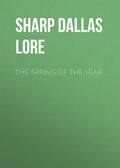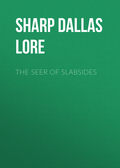
Sharp Dallas Lore
Summer
CHAPTER VIII
THE MOTHER MURRE
I hear the bawling of my neighbor’s cow. Her calf was carried off yesterday, and since then, during the long night, and all day long, her insistent woe has made our hillside melancholy. But I shall not hear her to-night, not from this distance. She will lie down to-night with the others of the herd, and munch her cud. Yet, when the rattling stanchions grow quiet and sleep steals along the stalls, she will turn her ears at every small stirring; she will raise her head to listen and utter a low, tender moo. Her full udder hurts; but her cud is sweet. She is only a cow.
Had she been a wild cow, or had she been out with her calf in a wild pasture, the mother-love in her would have lived for six months. Here in the barn she will be forced to forget her calf in a few hours, and by morning her mother-love shall utterly have died.
There is a mother-principle alive in all nature that never dies. This is different from mother-love. The oak tree responds to the mother-principle, and bears acorns. It is a law of life. The mother-love or passion, on the other hand, occurs only among the higher animals. It is very common; and yet, while it is one of the strongest, most interesting, most beautiful of animal traits, it is at the same time the most individual and variable of all animal traits.
This particular cow of my neighbor’s that I hear lowing, is an entirely gentle creature ordinarily, but with a calf at her side she will pitch at any one who approaches her. And there is no other cow in the herd that mourns so long after her calf. The mother in her is stronger, more enduring, than in any of the other nineteen cows in the barn. My own cow hardly mourns at all when her calf is taken away. She might be an oak tree losing its acorns, or a crab losing her hatching eggs, so far as any show of love is concerned.
The female crab attaches her eggs to her swimmerets and carries them about with her for their protection as the most devoted of mothers; yet she is no more conscious of them, and feels no more for them, than the frond of a cinnamon fern feels for its spores. She is a mother, without the love of the mother.
In the spider, however, just one step up the animal scale from the crab, you find the mother-love or passion. Crossing a field the other day, I came upon a large female spider of the hunter family, carrying a round white sack of eggs, half the size of a cherry, attached to her spinnerets. Plucking a long stem of grass, I detached the sack of eggs without bursting it. Instantly the mother turned and sprang at the grass-stem, fighting and biting until she got to the sack, which she seized in her strong jaws and made off with as fast as her long, rapid legs would carry her.
I laid the stem across her back and again took the sack away. She came on for it, fighting more fiercely than before. Once more she seized it; once more I forced it from her jaws, while she sprang at the grass-stem and tried to tear it to pieces. She must have been fighting for two minutes when, by a regrettable move on my part, one of her legs was injured. She did not falter in her fight. On she rushed for the sack as fast as I pulled it away. She would have fought for that sack, I believe, until she had not one of her eight legs to stand on, had I been cruel enough to compel her. It did not come to this, for suddenly the sack burst, and out poured, to my amazement, a myriad of tiny brown spiderlings. Before I could think what to do that mother spider had rushed among them and caused them to swarm upon her, covering her, many deep, even to the outer joints of her long legs. I did not disturb her again, but stood by and watched her slowly move off with her encrusting family to a place of safety.
I had seen these spiders try hard to escape with their egg-sacks before, but had never tested the strength of their purpose. For a time after this experience I made a point of taking the sacks away from every spider I found. Most of them scurried off to seek their own safety; one of them dropped her sack of her own accord; some of them showed reluctance to leave it; some of them a disposition to fight; but none of them the fierce, consuming mother-fire of the one with the hurt leg.
Among the fishes, much higher animal forms than the spiders, we find the mother-love only in the males. It is the male stickleback that builds the nest, then goes out and drives the female in to lay her eggs, then straightway drives her out to prevent her eating them, then puts himself on guard outside the nest to protect them from other sticklebacks and other enemies, until the young shall hatch and be able to swim away by themselves. Here he stays for a month, without eating or sleeping, so far as we know.
It is the male toadfish that crawls into the nest-hole and takes charge of the numerous family. He may dig the hole, too, as the male stickleback builds the nest. I do not know as to that. But I have raised many a stone in the edge of the tide along the shore of Naushon Island in Buzzard’s Bay, to find the under surface covered with round, drop-like, amber eggs, and in the shallow cavity beneath, an old male toadfish, slimy and croaking, and with a countenance ugly enough to turn a prowling eel to stone. The female deposits the eggs, glues them fast with much nicety to the under surface of the rock, as a female might, and finishes her work. Departing at once, she leaves the coming brood to the care of the male, who from this time, without relief or even food in all probability, assumes the rôle and all the responsibilities of mother, and must consequently feel all the mother-love.
Something like this is true of the common hornpout, or catfish, I believe, though I have never seen it recorded, and lack the chance at present of proving my earlier observations. I think it is father catfish that takes charge of the brood, of the swarm of kitten catfish, from the time the spawn is laid.
A curious sharing of mother qualities by male and female is shown in the Surinam toads of South America, where the male, taking the newly deposited eggs, places them upon the back of the female. Here, glued fast by their own adhesive jelly, they are soon surrounded by cells grown of the skin of the back, each cell capped by a lid. In these cells the eggs hatch, and the young go through their metamorphoses, apparently absorbing some nourishment through the skin of their mother. Finally they break through the lids of their cells and hop away. They might as well be toadstools upon a dead stump, so far as motherly care or concern goes, for, aside from allowing the male to spread the eggs upon her back, she is no more a mother to them than the dead stump is to the toadstools. She is host only to the little parasites.
I do not know of any mother-love among the reptiles. The mother-passion, so far as my observation goes, plays no part whatever in the life of reptiles. Whereas, passing on to the birds, the mother-passion becomes by all odds the most interesting thing in bird-life.
And is not the mother-passion among the mammals even more interesting? It is as if the watcher in the woods went out to see the mother animal only. It is her going and coming that we follow; her faring, foraging, and watch-care that let us deepest into the secrets of wild animal life.
On one of the large estates here in Hingham, a few weeks ago, a fox was found to be destroying poultry. The time of the raids, and their boldness, were proof enough that the fox must be a female with young. Poisoned meat was prepared for her, and at once the raids ceased. A few days later one of the workmen of the estate came upon the den of a fox, at the mouth of which lay dead a whole litter of young ones. They had been poisoned. The mother had not eaten the prepared food herself, but had carried it home to her family. They must have died in the burrow, for it was evident from the signs that she had dragged them into the fresh air to revive them, and deposited them gently on the sand by the hole. Then in her perplexity she had brought various tidbits of mouse and bird and rabbit, which she placed at their noses to tempt them to wake up out of their strange sleep and eat. No one knows how long she watched beside the lifeless forms, nor what her emotions were. She must have left the neighborhood soon after, however, for no one has seen her since about the estate.
The bird mother is the bravest, tenderest, most appealing thing one ever comes upon in the fields. It is the rare exception, but we sometimes find the real mother wholly lacking among the birds, as in the case of our notorious cowbird, who sneaks about, watching her chance, when some smaller bird is gone, to drop her egg into its nest. The egg must be laid, the burden of the race has been put upon the bird, but not the precious burden of the child. She lays eggs; but is not a mother.
The same is true of the European cuckoos, but not quite true, in spite of popular belief, of our American cuckoos. For our birds (both species) build rude, elementary nests as a rule, and brood their eggs. Occasionally they may use a robin’s or a catbird’s nest, in order to save labor. So undeveloped is the mother in the cuckoo that if you touch her eggs she will leave them – abandon her rude nest and eggs as if any excuse were excuse enough for an escape from the cares of motherhood. How should a bird with so little mother-love ever learn to build a firm-walled, safe, and love-lined nest?
The great California condor is a most faithful and anxious mother; the dumb affection of both parent birds, indeed, for their single offspring is pathetically human. On the other hand, the mother in the turkey buzzard is so evenly balanced against the vulture in her that I have known a brooding bird to be so upset by the sudden approach of a man as to rise from off her eggs and devour them instantly, greedily, and make off on her serenely soaring wings into the clouds.
Such mothers, however, are not the rule. The buzzard, the cuckoo, and the cowbird are the striking exceptions. The flicker will keep on laying eggs as fast as one takes them from the nest-hole, until she has no more eggs to lay. The quail will sometimes desert her nest if even a single egg is so much as touched, but only because she knows that she has been discovered and must start a new nest, hidden in some new place, for safety. She is a wise and devoted mother, keeping her brood with her as a “covey” all winter long.
One of the most striking cases of mother-love which has ever come under my observation, I saw in the summer of 1912 on the bird rookeries of the Three-Arch Rocks Reservation off the coast of Oregon.
We were making our slow way toward the top of the outer rock. Through rookery after rookery of birds we climbed until we reached the edge of the summit. Scrambling over this edge, we found ourselves in the midst of a great colony of nesting murres – hundreds of them – covering this steep rocky part of the top.
As our heads appeared above the rim, many of the colony took wing and whirred over us out to sea, but most of them sat close, each bird upon its egg or over its chick, loath to leave, and so expose to us the hidden treasure.
The top of the rock was somewhat cone-shaped, and in order to reach the peak and the colonies on the west side we had to make our way through this rookery of the murres. The first step among them, and the whole colony was gone, with a rush of wings and feet that sent several of the top-shaped eggs rolling, and several of the young birds toppling over the cliff to the pounding waves and ledges far below.
We stopped, but the colony, almost to a bird, had bolted, leaving scores of eggs and scores of downy young squealing and running together for shelter, like so many beetles under a lifted board.
But the birds had not every one bolted, for here sat two of the colony among the broken rocks. These two had not been frightened off. That both of them were greatly alarmed, any one could see from their open beaks, their rolling eyes, their tense bodies on tiptoe for flight. Yet here they sat, their wings out like props, or more like gripping hands, as if they were trying to hold themselves down to the rocks against their wild desire to fly.
And so they were, in truth, for under their extended wings I saw little black feet moving. Those two mother murres were not going to forsake their babies! No, not even for these approaching monsters, such as they had never before seen, clambering over their rocks.
What was different about these two? They had their young ones to protect. Yes, but so had every bird in the great colony its young one, or its egg, to protect, yet all the others had gone. Did these two have more mother-love than the others? And hence, more courage, more intelligence?
We took another step toward them, and one of the two birds sprang into the air, knocking her baby over and over with the stroke of her wing, and coming within an inch of hurling it across the rim to be battered on the ledges below. The other bird raised her wings to follow, then clapped them back over her baby. Fear is the most contagious thing in the world; and that flap of fear by the other bird thrilled her, too, but as she had withstood the stampede of the colony, so she caught herself again and held on.
She was now alone on the bare top of the rock, with ten thousand circling birds screaming to her in the air above, and with two men creeping up to her with a big black camera that clicked ominously. She let the multitude scream, and with threatening beak watched the two men come on. A motherless baby, spying her, ran down the rock squealing for his life. She spread a wing, put her bill behind him and shoved him quickly in out of sight with her own baby. The man with the camera saw the act, for I heard his machine click, and I heard him say something under his breath that you would hardly expect a mere man and a game-warden to say. But most men have a good deal of the mother in them; and the old bird had acted with such decision, such courage, such swift, compelling instinct, that any man, short of the wildest savage, would have felt his heart quicken at the sight.
“Just how compelling might that mother-instinct be?” I wondered. “Just how much would that mother-love stand?” I had dropped to my knees, and on all fours had crept up within about three feet of the bird. She still had chance for flight. Would she allow me to crawl any nearer? Slowly, very slowly, I stretched forward on my hands, like a measuring-worm, until my body lay flat on the rocks, and my fingers were within three inches of her. But her wings were twitching, a wild light danced in her eyes, and her head turned toward the sea.
For a whole minute I did not stir. I was watching – and the wings again began to tighten about the babies, the wild light in the eyes died down, the long, sharp beak turned once more toward me.
Then slowly, very slowly, I raised my hand, touched her feathers with the tip of one finger – with two fingers – with my whole hand, while the loud camera click-clacked, click-clacked hardly four feet away!
It was a thrilling moment. I was not killing anything. I had no long-range rifle in my hands, coming up against the wind toward an unsuspecting creature hundreds of yards away. This was no wounded leopard charging me; no mother-bear defending with her giant might a captured cub. It was only a mother-bird, the size of a wild duck, with swift wings at her command, hiding under those wings her own and another’s young, and her own boundless fear!
For the second time in my life I had taken captive with my bare hands a free wild bird. No, I had not taken her captive. She had made herself a captive; she had taken herself in the strong net of her mother-love.
And now her terror seemed quite gone. At the first touch of my hand I think she felt the love restraining it, and without fear or fret she let me reach under her and pull out the babies. But she reached after them with her bill to tuck them back out of sight, and when I did not let them go, she sidled toward me, quacking softly, a language that I perfectly understood, and was quick to respond to. I gave them back, fuzzy and black and white. She got them under her, stood up over them, pushed her wings down hard around them, her stout tail down hard behind them, and together with them pushed in an abandoned egg that was close at hand. Her own baby, some one else’s baby, and some one else’s forsaken egg! She could cover no more; she had not feathers enough. But she had heart enough; and into her mother’s heart she had already tucked every motherless egg and nestling of the thousands of frightened birds, screaming and wheeling in the air high over her head.
CHAPTER IX
MOTHER CAREY’S CHICKENS
“Who has not wondered,” I asked, many years ago, “as he has seen the red rim of the sun sink down in the sea, where the little brood of Mother Carey’s chickens skimming round the vessel would sleep that night?” Here on the waves, no doubt, but what a bed! You have seen them, or you will see them the first time you cross the ocean, far out of sight of land – a little band of small dark birds, veering, glancing, skimming the heaving sea like swallows, or riding the great waves up and down, from crest to trough, as easily as Bobolink rides the swaying clover billows in the meadow behind the barn.
I have stood at the prow and watched them as the huge steamer ploughed her way into the darkening ocean. Down in the depths beneath me the porpoises were playing, – as if the speeding ship, with its mighty engines, were only another porpoise playing tag with them, – and off on the gray sea ahead, where the circle of night seemed to be closing in, this little flock of stormy petrels, Mother Carey’s chickens, rising, falling with the heave and sag of the sea, so far, for such little wings, from the shore!
You will see them, and you will ask yourself, as I asked myself, “Where is their home? Where do they nest?” I hope you will also have a chance to answer the question some time for yourself, as I had a chance to answer it for myself recently, out on the Three-Arch Rocks, in the Pacific, just off the coast of Oregon.
I visited the rocks to see all their multitudinous wild life, – their gulls, cormorants, murres, guillemots, puffins, oyster-catchers, and herds of sea-lions, – but more than any other one thing I wanted to see the petrels, Kaeding’s petrels, that nest on the top of Shag Rock, the outermost of the three rocks of the Reservation.
No, not merely to see the petrels: what I really wished to do was to stay all night on the storm-swept peak in order to hear the petrels come back to their nests on the rock in the dusk and dark. My friend Finley had done it, years before, on this very rock. On the steep north slope of the top he had found a safe spot between two jutting crags, and, wrapping himself in his blanket as the sun went down behind the hill of the sea, had waited for the winnowing of the small mysterious wings.
Just to sleep in such a bed would be enough. To lie down far up on the ragged peak of this wild sea rock, with the break and swash of the waves coming up from far beneath you, with the wide sea-wind coming in, and the dusk spreading down, and the wild sea-birds murmuring in their strange tongues all about you – it would be enough just to turn one’s face to the lonely sky in such a spot and listen. But how much more to hear suddenly, among all these strange sounds, the swift fanning of wings – to feel them close above your face – and to see in the dim dusk wavering shadowy forms, like a troop of longwinged bats, hovering over the slope and chittering in a rapid, unbirdlike talk, as if afraid the very dark might hear them!
That was what I wanted so much to hear and to see. For down in a little burrow, in the accumulated earth and guano of the top, under each of these hovering shadows, would be another shadow, waiting to hear the beating of the wings and the chitter above; and I wanted to see the mate in the burrow come out and greet the mate that had been all day upon the sea.
This petrel digs itself a little burrow and lays one egg. The burrow might hold both birds at once, but one seldom finds two birds in the burrow together. While one is brooding, the other is off on its wonderful wings – away off in the wake of your ocean steamer, perhaps, miles and miles from shore. But when darkness falls it remembers its nest and speeds home to the rock, taking its place down in the little black burrow, while the mate comes forth and spreads its wings out over the heaving water, not to return, it may be, until the night and the day have passed and twilight falls again.
We landed on a ledge of Shag Rock, driving off a big bull sea-lion who claimed this particular slab of rock as his own. We backed up close to the shelf in a yawl boat, and as the waves rose and fell, watched our chance to leap from the stern of the little boat to the rock. Thus we landed our cameras, food and water, and other things, then we dragged the boat up, so that, a storm arising or anything happening to the small steamer that had brought us, we might still get away to the shore.
It was about the middle of the forenoon. All the morning, as we had steamed along, a thick fog had threatened us; but now the sun broke out, making it possible to use our cameras, and after a hasty lunch we started for the top of the rock – a climb that looked impossible, and that was pretty nearly as impossible as it looked.
It had been a slow, perilous climb; but, once on the summit, where we could move somewhat freely and use the cameras, we hurried from colony to colony to take advantage of the uncertain sunlight, which, indeed, utterly failed us after only an hour’s work. But, as I had no camera, I made the best of it, giving all my time to studying the ways of the birds. Besides, I had come to stay on the peak all night; I could do my work well enough in the dark. But I could not do it in the wind and rain.
The sun went into the clouds about four o’clock, but so absorbed was I in watching, and so thick was the air with wings, so clangorous with harsh tongues, that I had not seen the fog moving in, or noticed that the gray wind of the morning had begun to growl about the crags. Looking off to seaward, I now saw that a heavy bank of mist had blurred the sky-line and settled down upon the sea. The wind had freshened; a fine, cold drizzle was beginning to fall, and soon came slanting across the peak. The prospect was grim and forbidding. Then the rain began. The night was going to be dark and stormy, too wet and wild for watching, here where I must hang on with my hands or else slip and go over – down – down to the waves below.
We started to descend at once, while there was still light enough to see by, and before the rocks were made any slipperier by the rain. We did not fear the wind much, for that was from the north, and we must descend by the south face, up which we had come.
I was deeply disappointed. My night with the petrels on the top was out of the question. Yet as I backed over the rim of that peak, and began to pick my way down, it was not disappointment, but fear that I felt. It had been bad enough coming up; but this going down! – with the cold, wet shadow of night encircling you and lying dark on the cold, sullen sea below – this was altogether worse.
The rocks were already wet, and the footing was treacherous. As we worked slowly along, the birds in the gathering gloom seemed to fear us less, flying close about our heads, their harsh cries and winging tumult adding not a little to the peril of the descent. And then the looking down! and then the impossibility at places of even looking down – when one could only hang on with one’s hands and feel around in the empty air with one’s feet for something to stand on!
I got a third of the way down, perhaps, and then stopped. The men did not laugh at me. They simply looped a rope about me, under my arms, and lowered me over the narrow shelves into the midst of a large murre colony, from which point I got on alone. Then they tied the rope about Dallas, my eleven-year-old son, who was with me on the expedition, and lowered him.
He came bumping serenely down, smoothing all the little murres and feeling of all the warm eggs on the way, as if they might have been so many little kittens, and as if he might have been at home on the kitchen floor, instead of dangling down the face of a cliff two hundred or more feet above the sea.
Some forty feet from the waves was a weathered niche, or shelf, eight or ten feet wide. Here we stopped for the night. The wind was from the other side of the rock; the overhanging ledge protected us somewhat from above, though the mist swept about the steep walls to us, and the drizzle dripped from overhead. But as I pulled my blanket about me and lay down beside the other men the thought of what the night must be on the summit made the hard, damp rock under me seem the softest and warmest of beds.
But what a place was this to sleep in! – this narrow ledge with a rookery of wild sea-birds just above it, with the den of a wild sea-beast just below it, with the storm-swept sky shut down upon it, and the sea, the crawling, sinister sea, coiling and uncoiling its laving folds about it, as with endless undulations it slipped over the sunken ledges and swam round and round the rock.
What a place was this to sleep! I could not sleep. I was as wakeful as the wild beasts that come forth at night to seek their prey. I must catch a glimpse of Night through her veil of mist, the gray, ghostly Night, as she came down the long, rolling slope of the sea, and I must listen, for my very fingers seemed to have ears, so many were the sounds, and so strange – the talk of the wind on the rock, the sweep of the storm, the lap of the waves, the rumbling mutter of the wakeful caverns, the cry of birds, the hoarse grumbling growl of the sea-lions swimming close below.
The clamor of the birds was at first disturbing. But soon the confusion caused by our descent among them subsided; the large colony of murres close by our heads returned to their rookery; and with the rain and thickening dark there spread everywhere the quiet of a low murmurous quacking. Sleep was settling over the rookeries.
Down in the sea below us rose the head of an old sea-lion, the old lone bull whose den we had invaded. He was coming back to sleep. He rose and sank, blinking dully at the cask we had left on his ledge; then clambered out and hitched slowly up toward his sleeping-place. I counted the scars on his head, and noted the fresh deep gash on his right side. I could hear him blow and breathe.
I drew back from the edge, and, pulling the piece of sail-cloth over me and the small boy at my side, turned my face up to the slanting rain. Two young gulls came out of their hiding in a cranny and nestled against my head, their parents calling gently to them from time to time all night long. In the murre colony overhead there was a constant stir and a soft, low talk, and over all the rock, through all the darkened air there was a silent coming and going of wings – wings – of the stormy petrels, some of them, I felt sure, the swift shadow wings of Mother Carey’s chickens that I had so longed to hear come winnowing in from afar on the sea.







